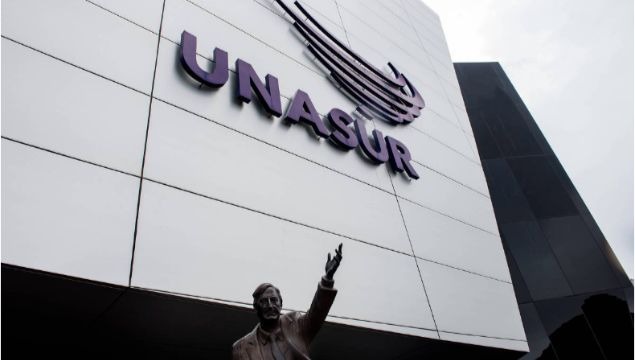Latest Photo Galleries
Brazilian Markets
17h38 Bovespa |
+0,02% | 124.196 |
16h43 Gold |
0,00% | 117 |
17h00 Dollar |
+0,15% | 5,2507 |
16h30 Euro |
+0,49% | 2,65250 |
ADVERTISING
Head of Unasur Resigns in Organizational Crisis
08/02/2018 - 13h33
Advertising
PATRÍCIA CAMPOS MELLO
SÃO PAULO
Yuri Chillán, a Colombian and the de facto head of the Union of South American Nations (Unasul), presented his letter of resignation on Tuesday (the 31st), shinning a spotlight on a series of scandals at the institution and its generalized destitution.
Unasul is functioning without a General Secretary or a Chief of Staff, with only 2 of its 5 directors, and has only 25% of the funds necessary to cover its budget while at the same time running the risk of losing its headquarters.
Ever since the beginning of the year, Unasul hasn't held any significant meetings and its employees are completely idle, spending their time surfing on the internet.
Out of an original staff of 48 employees, only 27 are still around, the only occupants of a 19.5 thousand m2 (210 thousand square foot) facility in a five-story building in Quito, Equator.
The US$ 43.5 million (R$ 163 million) headquarters had been previously donated by Equator's government to Unasul, but now, the country's President, Lenin Morena, has requested the building's return. Maintenance costs alone consume US$ 2 million (R$ 7.5 million) per year. Colombia's President Elect, Iván Duque, has announced that he is removing his country from the organization.
| Johis Alarcón/Folhapress/Folhapress | ||
 |
||
| Néstor Kirchner's statue in front of the Unasul headquarter in Quito |
Unasul was created in 2008 by former presidents Luiz Inácio Lula da Silva, Hugo Cháves (Venezuela) and Néstor Kirchner (Argentina). The purpose was to foster and strengthen integration in the region and to function as a regional institution without influence from the United States.
The organization's current crisis began in 2016 when Venezuela, Equator and Bolivia blocked the nomination of Argentinian ambassador José Octávio Bordón to replace Ernesto Samper, who was the General Secretary at the time. Argentina argued that the replacement needed to be a former president or chancellor.
Translated by LLOYD HARDER



